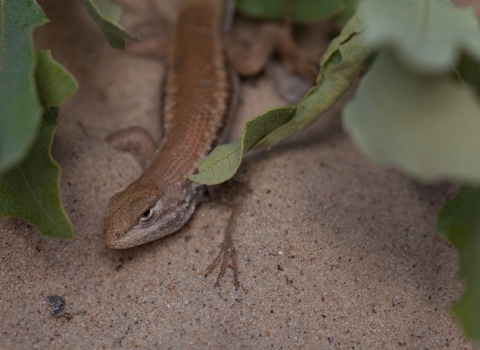Albuquerque, N.M.– After a comprehensive analysis, the U.S. Fish and Wildlife Service (Service) proposes to designate approximately 1,636.9 acres of critical habitat in Otero County, New Mexico for the endangered Sacramento Mountains checkerspot butterfly (Euphydryas anicia cloudcrofti). The Service seeks public input to consider for this decision.
This critical habitat designation identifies areas that are particularly important to the conservation of this butterfly, where actions of federal agencies or activities that require a federal permit or funding must be analyzed to prevent adverse modification of their habitat. It does not mean that development cannot occur in these areas, only that federal agencies must consult with the Service if they are conducting, funding or permitting activities that may affect the species.
The Sacramento Mountains is an isolated mountain range in south-central New Mexico. The butterfly is small and checkered with dark brown, red, orange, cream, and black spots, punctuated with dark lines. During development, the checkerspot butterfly larvae change from bare and brown to wooly and black with orange hairs. The butterfly only inhabits the Sacramento Mountains’ high-altitude meadows. It requires a specific host plant and nectar sources for survival.
Surveys completed in the 1990s found the butterfly occupied approximately 32 square miles near the village of Cloudcroft, N.M. A 2020 survey estimated the butterfly occupies approximately two square miles of suitable habitat.
The Sacramento Mountains checkerspot butterfly is imperiled by a variety of threats including incompatible grazing, recreation, invasive and nonnative plants, climate change climate change
Climate change includes both global warming driven by human-induced emissions of greenhouse gases and the resulting large-scale shifts in weather patterns. Though there have been previous periods of climatic change, since the mid-20th century humans have had an unprecedented impact on Earth's climate system and caused change on a global scale.
Learn more about climate change , and an altered fire regime.
The Service submitted the draft rule to the Federal Register today. Comments must be received within 60 days of its publication in the Federal Register (comment period ends Oct 10). Information on how to submit comments will be available at https://www.regulations.gov by searching under docket number FWS-R2-ES-2021-0069. Information on how to request a hearing is also included in the Federal Register notice.




